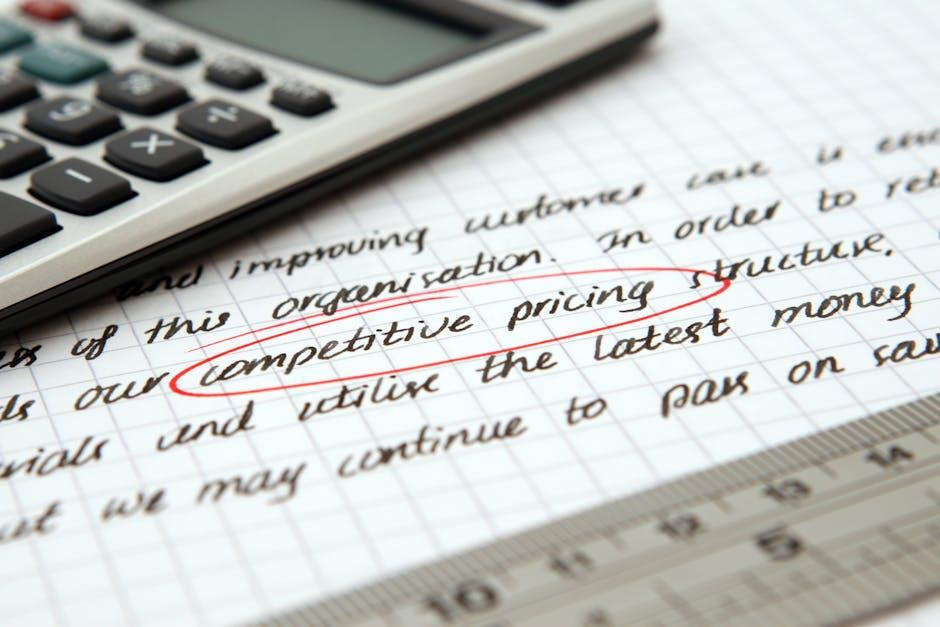Table of Contents
- Understanding Domain Pricing Models
- Factors Influencing Domain Costs
- Exploring Different Domain Extensions
- Hidden Costs of Purchasing a Domain
- Tips for Getting the Best Domain Deals
- Q&A
- Concluding Remarks


Understanding Domain Pricing Models
When exploring the costs of acquiring a domain, it’s essential to grasp the different pricing models that influence how much you will ultimately pay. Domain pricing can vary significantly based on factors such as the domain extension, registrar, and any supplementary services offered. The following are the primary pricing models you might encounter:
- Standard Pricing: Most common for popular domain extensions like .com, .org, and .net. Prices typically range from $10 to $20 per year.
- Premium Domains: These domains are characterized by short, memorable names or keywords that attract businesses or brands. They can cost anywhere from hundreds to thousands of dollars.
- Renewal Fees: After your first year, renewal fees may differ from the initial purchase cost. Be sure to check if your registrar charges a premium renewal fee compared to the original price.
Additional features can affect the total cost of domain ownership. Many registrars offer package deals, including privacy protection, which hides your information from public databases, and email hosting services, which can lead to additional, recurring costs. Here’s a useful table summarizing some optional features to consider:
| Feature | Cost Range (Annually) |
|---|---|
| Privacy Protection | $5 – $15 |
| Email Hosting | $20 – $50 |
| SSL Certificate | $10 – $150 |
Ultimately, the domain pricing model you choose should align with your goals and budget. Understanding these variations helps in making informed decisions, whether you’re a casual blogger or launching a commercial enterprise. Pay close attention to the fine print regarding renewal rates and additional charges, ensuring your domain project remains within budget throughout its lifespan.
Factors Influencing Domain Costs
When considering purchasing a domain, several factors contribute to the overall cost. One of the primary aspects is the domain extension (TLD) you choose. Traditional options like .com, .net, or .org often come at a lower price point due to their popularity and widespread use. In contrast, newer or less common TLDs, such as .tech or .design, may demand higher fees because they target niche markets. In addition, premium domain extensions can carry a hefty price tag, reflective of their brand potential and market demand.
The length and complexity of the domain name also play a crucial role in determining costs. Short, memorable domain names that utilize common keywords are typically more sought-after and, subsequently, more expensive. In contrast, longer names or unusual spellings may be more affordable but can potentially be less effective in terms of SEO and branding. A distinct, catchy domain is not only easier for users to remember but can also significantly affect your online presence and marketing success.
the registration period impacts the cost significantly. Most registrars offer options ranging from one year to multiple years, with discounts sometimes available for longer commitments. Additionally, renewal fees and any extra services like privacy protection, SSL certificates, or hosting can contribute to ongoing costs. Understanding these variable elements will enable you to make a more informed decision about your domain purchase.


Exploring Different Domain Extensions
When considering a domain for your website, one of the most intriguing aspects is the variety of domain extensions available. While .com domains are ubiquitous and often the first choice for businesses, there are numerous other extensions that cater to specific industries, interests, and geographic locations. For instance, the .org extension is often reserved for non-profit organizations, while .tech can be ideal for technology-related ventures. The rise of creative extensions, such as .ai for artificial intelligence or .design for design portfolios, allows businesses and individuals to showcase their identity effectively.
Each extension comes with its own pricing structure, which can be influenced by factors such as demand, purpose, and registry policies. Generally, extensions like .com and .net are priced competitively, ranging from $10 to $20 per year. In contrast, specialty extensions can vary significantly. For example, premium extensions—often sought after by niche markets—can command fees reaching beyond $50 per year, and some rare domains may be listed for thousands of dollars. It’s essential to consider your long-term brand strategy when selecting a domain extension.
To provide a clearer picture of the options and their price ranges, here’s a quick reference table:
| Domain Extension | Typical Cost (per year) | Best For |
|---|---|---|
| .com | $10 – $20 | General business or personal sites |
| .org | $10 – $15 | Non-profit organizations |
| .tech | $25 – $50 | Technology-related ventures |
| .ai | $50 – $100 | Artificial intelligence businesses |
Ultimately, the choice of domain extension can play a crucial role in positioning your brand online. Opting for an extension that aligns with your business’s focus and resonates with your audience can enhance credibility and memorability. Take the time to weigh your options, ensuring that your selected domain not only fits your budget but also contributes positively to your long-term online presence.


Hidden Costs of Purchasing a Domain
When budgeting for your new domain, it’s crucial to account for expenses beyond the initial registration fee. One of the most significant hidden costs is renewal fees. Many registrars offer enticing first-year discounts, but the costs can nearly double in subsequent years. It’s essential to read the fine print and be prepared for these increases to avoid unpleasant surprises down the road.
Another factor to consider is the potential need for additional services that complement your domain purchase. Options such as privacy protection, which keeps your personal information confidential, and email hosting, which allows you to create professional email addresses associated with your domain, can quickly add up. Here’s a breakdown of common add-ons:
| Service | Average Cost Per Year |
|---|---|
| Privacy Protection | $5-$15 |
| Email Hosting | $24-$60 |
| Website Hosting | $120-$300 |
Additionally, consider the cost of transferring your domain if you decide to switch registrars. Most companies charge a transfer fee, which can be a headache if you’re unaware of the process beforehand. This cost can vary widely, so always check the policies of the alternative registrar to ensure you aren’t caught off guard. Planning for these factors allows you to budget more accurately and enjoy your new domain without financial surprises.


Tips for Getting the Best Domain Deals
Finding the right domain deal can make a significant difference in your online presence without breaking the bank. Start by comparing prices across multiple registrars. Websites like GoDaddy, Namecheap, and Bluehost often have different pricing structures. Consider looking for discounts or promotional deals that may offer significant savings for new users. Many companies offer lower prices for the first year, so keep this in mind when budgeting for your domain.
Be sure to examine the additional features that might come with a domain purchase. While the base price is important, it’s crucial to understand what services you are getting for your money. Look for registrars that provide features like WHOIS privacy protection, domain forwarding, and email hosting. These features can save you from extra costs down the line, making a slightly higher initial price worth it.
| Registrar | Initial Cost | Renewal Cost | Features Included |
|---|---|---|---|
| GoDaddy | $0.99 | $17.99 | Free WHOIS privacy, 24/7 support |
| Namecheap | $8.88 | $12.98 | Free DNS, email forwarding |
| Bluehost | $2.95 | $15.99 | Free SSL, website builder |
Lastly, don’t overlook the possible benefits of bulk purchasing or multi-year registration. Many registrars offer discounts if you buy your domain for multiple years at once. This not only saves money over time but also secures your domain from potential future increases in renewal prices. Be strategic about the extensions you choose as well; sometimes opting for a less popular extension, such as .net or .info, can be cheaper but still provide a great alternative to the common .com.
Q&A
Q&A: How Much Does It Cost to Buy Your Own Domain?
Q1: What is a domain name, and why do I need one?
A: A domain name is your website’s address on the internet—think of it as your home’s street name. You need one to establish an online presence, making it easier for visitors to find you. Whether you’re starting a blog, showcasing your portfolio, or launching a business, a domain name is essential for branding and credibility.Q2: How much does it actually cost to purchase a domain name?
A: The cost of a domain name can vary widely, generally ranging from $10 to $50 per year for standard domains. Prices can go higher for premium domains that are short, memorable, or use popular keywords. Additionally, some domain extensions (like .io or .ai) may come at a premium.Q3: Are there any additional fees I should be aware of?
A: Yes, there can be a few extras to keep in mind. Most registrars charge a fee for domain registration, renewal, and sometimes for WHOIS privacy protection, which keeps your personal information private. Additionally, if you choose to set up email hosting or web hosting, that will add to your overall costs.Q4: Where can I buy a domain name?
A: You can purchase domain names from various online registrars such as GoDaddy, Namecheap, and Google Domains. Each registrar has its own pricing, customer service, and additional features, so it’s worth comparing to find the best fit for your needs.Q5: Do I need to buy web hosting along with my domain?
A: Not necessarily, but it’s common to purchase hosting and a domain from the same provider for convenience. The domain points to your website while web hosting provides the server space for your site’s files. Some companies offer packages that include both, which can save you time and sometimes even money.Q6: How often do I need to renew my domain?
A: Most domain registrations are annual, meaning you’ll need to renew your domain every year to keep ownership. Some registrars offer multi-year registration options, which can save you the hassle of annual reminders and ensure you won’t lose your domain due to an oversight.Q7: Can I get a free domain?
A: Some web hosting services offer free domains for the first year when you sign up for their hosting plans. However, keep in mind that these often come with conditions, and you’ll likely face renewal costs in subsequent years.Q8: What should I consider when choosing a domain name?
A: Opt for a domain name that’s catchy, easy to spell, and reflects your brand or content. Also, consider the extension—.com is still the most recognized, but depending on your niche, you might find other extensions more suitable. Always ensure it’s not too similar to existing brands to avoid confusion.Q9: What if I want a domain that’s already taken?
A: If the domain is taken, you can try to buy it from the current owner, but this can be pricey. Alternatively, consider variations in spelling, different extensions (like .net or .org), or even creating a unique name that aligns with your brand values.Q10: Is it worth investing in a premium domain name?
A: If the domain name is short, memorable, and aligns perfectly with your brand, it can be a worthwhile investment. A strong domain name can enhance your branding efforts and potentially attract more visitors. However, always weigh the costs against your budget and the potential return on investment.Feel free to dive deeper into any of the topics discussed here to find the best domain solution that meets your needs!

